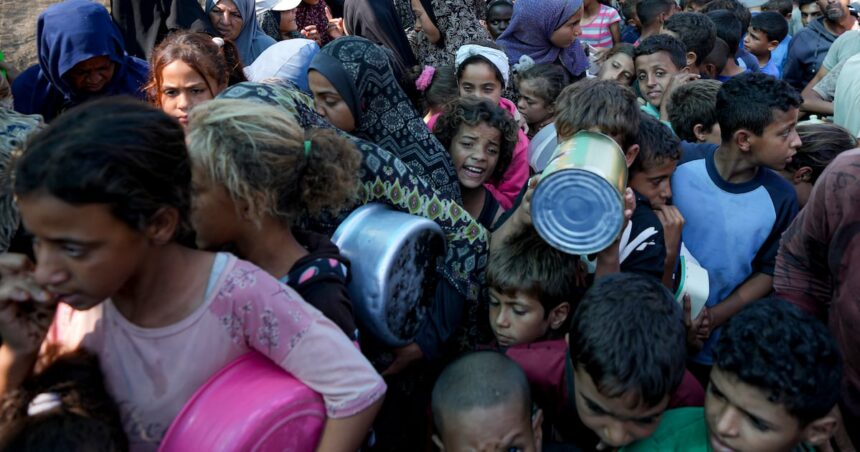As I gaze at the cracked phone screen in my Brussels hotel room, Yasmine Khalil’s voice breaks through the poor connection from Toronto. “Yesterday, we found out my nephew died of an infected wound. There was no medicine available,” she tells me, her voice strained after nearly nine months of bearing witness to her family’s suffering in Gaza from thousands of miles away.
The 34-year-old Palestinian-Canadian teacher has been my contact since December, when I first reported on cross-border families caught between diplomatic failures and humanitarian catastrophe. Our conversation this week marks her family’s darkest chapter yet.
“They just want to live,” Yasmine says. “My sister and her four remaining children sleep in a tent that floods when it rains. There’s barely any food. No clean water. And Canada keeps saying they’re working on it.”
Her sister Layla’s family has moved seven times since October, each relocation pushing them further south as fighting intensified. Last week, they lost their 16-year-old son Tariq to what should have been a treatable wound infection—another casualty not from bombs but from the collapsed medical system.
According to UN OCHA’s latest assessment, Gaza’s healthcare system is functioning at less than 30% capacity, with only 13 of 36 hospitals partially operational. The World Food Programme reports “catastrophic hunger levels” affecting over 90% of Gaza’s 2.2 million residents.
“We feel helpless,” says Mahmoud Khalil, Yasmine’s father, who immigrated to Canada in 1989. At 72, he’s spent nearly $20,000 trying to bring his daughter’s family to safety. “I’ve written to my MP twelve times. I’ve called Immigration Canada so often they recognize my voice.”
The Khalil family’s struggle exemplifies the bureaucratic labyrinth facing hundreds of Palestinian-Canadian families. Immigration, Refugees and Citizenship Canada (IRCC) established a “temporary resident pathway” for extended family members in Gaza, but applicants report processing delays, complex documentation requirements, and unclear instructions.
“They ask for documents from people who have lost everything,” Yasmine explains. “How do you get a passport photo when there’s no electricity? How do you scan birth certificates that were destroyed when your home was bombed?”
Standing outside the Canadian Embassy in Brussels yesterday—where I’m covering NATO discussions on Middle East stability—I spoke with humanitarian aid coordinator Helena Bjørk from the Norwegian Refugee Council.
“The situation for Palestinian-Canadians trying to extract family members is uniquely difficult,” Bjørk explained. “Egypt restricts movement through Rafah. Israel controls who exits through Kerem Shalom. And Western governments, including Canada, haven’t applied sufficient diplomatic pressure to ensure their citizens’ families can leave.”
Yasmine’s sister applied for the Canadian program in January. Seven months later, they’re still waiting for final approval, trapped in what UN Secretary-General António Guterres has called “a humanitarian nightmare.”
I spoke with three other Palestinian-Canadian families this week, all describing similar bureaucratic hurdles. Nasser Abdelrahman, a Vancouver pharmacist, hasn’t heard from his elderly parents in Gaza for three weeks. Sara Dajani’s application to bring her brother’s family to Montreal has been “under review” since February.
When I pressed Immigration Canada for comment, spokesperson Rémi Larivière stated via email: “IRCC has dedicated additional resources to processing applications from Gaza. We understand the urgency and are working to reunite families as quickly as possible while maintaining security protocols.”
That official response provides little comfort to the Khalil family. “If I had blue eyes and blond hair, would my family still be waiting?” Yasmine asks pointedly. “I pay taxes here. I vote here. Why does my family matter less?”
Canadian immigration lawyers I consulted identified several systemic issues in the Gaza family reunification process. “There’s no expedited humanitarian pathway,” explains Toronto-based immigration attorney Karina Martinez. “The temporary resident program requires financial guarantees, medical exams that can’t be completed in Gaza, and documentation that’s nearly impossible to provide from a war zone.”
Meanwhile, community fundraisers have become a lifeline for families like the Khalils. The Palestinian Canadian Community Centre in Toronto has raised over $1.2 million to support reunification efforts and immediate humanitarian aid.
“We’re sending money for food, but there’s often nothing to buy,” Yasmine tells me. “Last week, my sister walked five kilometers to find clean water. She stood in line for six hours before being told there was none left.”
The psychological toll on Palestinian-Canadians is immense. Dr. Samer Abboud, a psychologist working with refugee families in Ottawa, describes what he calls “survivor’s guilt amplified by government inaction.”
“These families experience trauma from afar,” Dr. Abboud explains. “They eat while knowing their loved ones starve. They sleep in safety while their families face bombardment. And they face the added stress of navigating complex immigration systems that seem designed to fail them.”
As our call winds down, Yasmine shares a voice message she received from her 9-year-old niece Amira yesterday: “Auntie, I drew you a picture of our house in Canada. I made the door red because you said red is a happy color.”
That drawing may never arrive. But the hope it represents—the possibility of safety, of reunion, of normal childhood concerns—keeps Yasmine calling her MP every day, keeps her father depleting his retirement savings, keeps them believing Canada will eventually help.
“They just want to live,” Yasmine repeats, her voice barely audible now. “Is that really too much to ask?”






